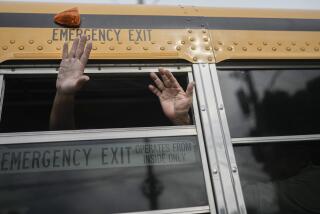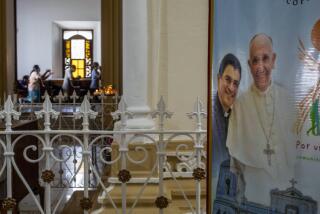Contra Leaders to Try to Force Managua Talks : Plan Flight to Capital in Surprise Overture to Meet Ortega; 3 Congressmen to Act as Observers
WASHINGTON — Nicaragua’s contra political leadership, executing a surprise public-relations stroke in the war against that nation’s socialist regime, said Thursday that three of its members will fly to Managua soon in an attempt to force Sandinista President Daniel Ortega to talk directly with them about a cease-fire.
The dramatic visit is to take place before the Nov. 7 deadline for a halt to the region’s guerrilla wars stipulated in a peace accord signed in August by Nicaragua and its four Central American neighbors. At least three U.S. congressmen will accompany the contra leaders as observers, the rebels’ six-member political directorate said at a news conference in the Capitol.
In Managua, according to the Associated Press, Ortega responded by threatening any visiting contra with prison.
“As long as they don’t accept amnesty and put down their arms, they are going to jail,” he reportedly said. “Even if they arrive accompanied by American congressmen, they will go to jail because they are guilty of crimes against the Nicaraguan people.”
Contra leader Alfonso Robelo, one of the directorate members who will make the journey, said that by traveling to Managua, contra leaders are not accepting Ortega’s offer of amnesty for rebels who return to Nicaragua or signaling any change in the war.
He did say that the rebels would consider calling a short truce in the war inside Nicaragua during the Managua visit.
The contras’ overture shifts the focus of the Central American peace debate from the rebels to Ortega, who repeatedly has rejected face-to-face meetings with the rebels, despite public pressure to do so from the originator of the plan, Costa Rica President Oscar Arias Sanchez, and other Central American political figures.
Ortega, the sole Central American leader to refuse to meet with rebels in his country, is also feeling growing pressure from European diplomats who have offered their services in arranging a cease-fire, one American expert said.
Ortega has called the contra leaders American puppets who would not seriously negotiate because they secretly hope to profit from a prolonged U.S.-financed war.
With the leadership’s announcement of an unconditional visit to Managua, one Administration official said Thursday, Ortega “either will have to put up or shut up.”
“It’s a highly calculated risk” that could alienate the contras’ fiercely anti-Sandinista guerrilla army from their political leaders, said another well-placed U.S. official, adding: “It’s about time they got a different kind of creative thinking here.”
Delay in Aid Urged
The rebels’ announcement comes amid growing international criticism of the Reagan Administration’s plan to seek $270 million in new military and humanitarian aid for the rebels, even as the regional peace process makes unsteady progress.
Salvadoran President Jose Napoleon Duarte, in Washington for a state visit, publicly urged Congress on Thursday to delay any new military aid to the contras’ 16,000-man army at least until next year, when the peace accord can be judged a success or failure.
Duarte’s request, which he called an “indispensable element” of the peace plan, appeared to oppose directly the White House plan to seek new contra aid next month.
“What we have said here is, ‘Don’t give any aid to the people who are rebels during this space (in negotiations) that we are asking,’ ” Duarte told a National Press Club audience. “And the maximum time we ask is 150 days” from the Aug. 7 date on which the peace accord was signed.
The accord calls for an end to all outside military aid to both the contras and leftist rebels in Guatemala and El Salvador.
Congressmen to Join Trip
Arizona Republican Sen. John McCain said Thursday that he will be among at least three U.S. lawmakers who will escort the contra leaders to Managua as observers and “for obvious reasons,” apparently to ensure their safety. The contras said that two other lawmakers, Rep. Mickey Edwards (R-Okla.) and Rep. Ike Skelton (D-Mo.), also have agreed to make the trip.
In addition to Robelo, rebel political directors Pedro Joaquin Chamorro and Azucena Ferry will travel to Managua for the appeal to Ortega, Administration sources said Thursday.
Contra directorate member Alfredo Cesar, a former Sandinista, said that the rebel leaders will make the Managua trip without setting conditions.
“There is nothing to prevent the Sandinistas from throwing in jail the Nicaraguan resistance,” he said, “except the people of Nicaragua and world opinion.”
There also is little to suggest that Ortega will agree quickly to talk with the rebels.
Contra leaders stressed Thursday that their trip is aimed only at establishing the terms for direct cease-fire talks between Ortega and themselves and not at making any progress toward a broader peace.
Further peace negotiations could cause divisions within the contras’ ground forces or alienate anti-Sandinista political forces already within Nicaragua that will want a say in any agreement with Ortega on future democratic reforms.
The rebels said they have asked Cardinal Miguel Obando y Bravo, Nicaragua’s Roman Catholic primate, to act as an intermediary in arranging the face-to-face talks with Ortega. Costa Rican Sanchez, architect of the peace accord, suggested earlier that the cardinal serve as a go-between in cease-fire talks, but was rebuffed by Ortega.
Under the proposal, the contras, lawmakers and a delegation that may include other Central American diplomats will fly a chartered aircraft from Costa Rica to Managua sometime after Oct. 20, roughly when Cardinal Obando is scheduled to return from a trip to the Vatican.
Ortega may refuse to meet with the rebels, but U.S. officials said Thursday that they consider it likely that he will agree eventually to the use of Obando as an intermediary.
The Managua trip has been privately considered by contra officials almost since the peace accord was signed Aug. 7 but an agreement among the six rebel leaders was not reached until recently, U.S. officials familiar with the plan said Thursday.
The trip also was put off because the rebel political leaders “needed time to explain to the men in the field what was happening so they wouldn’t feel they were being abandoned,” one official said.
A commission of contra military and civilian officials has spent more than a month drafting proposed conditions for a cease-fire with the Sandinistas, Robelo said, and the contras are “well prepared” for negotiations should Ortega consent to a meeting.
Nicaragua tries to sell peace plan to its people. Page 14.
More to Read
Sign up for Essential California
The most important California stories and recommendations in your inbox every morning.
You may occasionally receive promotional content from the Los Angeles Times.










